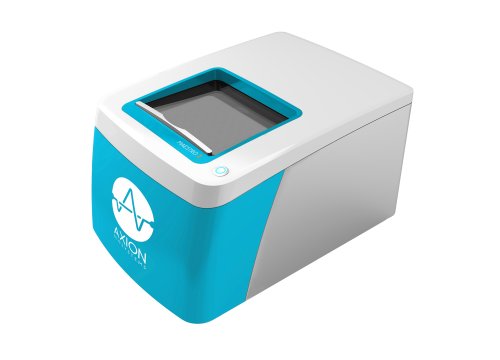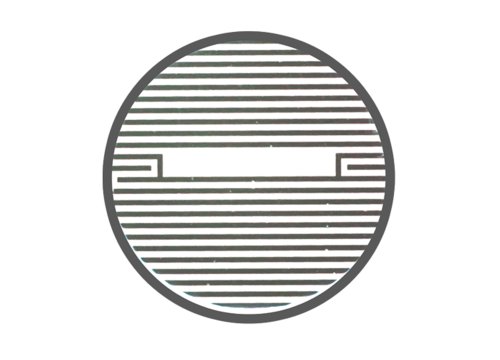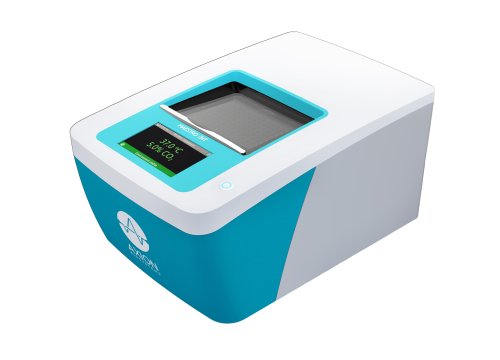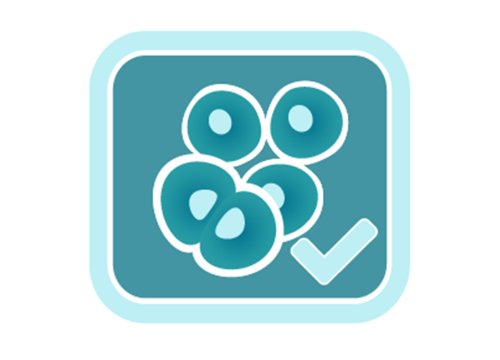BioInformant, 2021
The immunotherapy field is booming, with cell therapies like chimeric antigen receptor (CAR) T cells taking the lead. According to one forecast, the market is expected to reach $6.1 billion in size by 2030 for CAR-T therapies alone. The FDA approved the world’s first CAR-T therapy, Kymriah, in 2017, and it is now available at over 130 treatment centers across the United States.
As immunotherapies are approved for more cancers and awareness of the treatment modality increases, the global market will continue to grow. But developing these potentially life-saving treatments is not without challenges, and now, to help better understand how these cells function, Axion BioSystems is bringing its expertise in live-cell assay systems to help develop better preclinical models of immune-cell mediated killing of tumor cells.
A complex field with many potential targets
Immunotherapies offer a personalized approach to treating cancer, wherein the patient’s immune system is enhanced to target and kill cancer cells. A complicated and dynamic process, the immune response to cancer involves a host of different cells and pathways working in concert. Most immunotherapies focus on T-cell modulation, with CAR-T representing an estimated 57% of the cell therapy space.
CAR-T therapies work by engineering the cells to target specific markers found on cancer cells, such as CD19, to specifically recognize and kill cancer cells but leave healthy cells intact. Another common approach is to alter T-cell activation and inhibition pathways. For example, some tumors avoid immune detection by expressing PD-L1, a checkpoint protein that prevents T cells from attacking them. Checkpoint inhibitors that target PD-L1 or its receptor protein, PD-1, are specifically designed to bypass this defense. Another cytotoxic lymphocyte, natural killer cells, are also used for their ability to target and kill cancer cells, as well as to enhance T cell and antibody response.
Likewise, cancer itself is diverse and adaptive. Cells within a tumor may present markers differently, masking some cells (as is the case with PD-L1.) Furthermore, solid tumors present different challenges from liquid tumors, such as in blood cancers. The microenvironment tumors create can inhibit immune responses and prevent immune cell penetration within the tumor. With more than enough biology to keep track of, researchers need a simple assay to capture these complex processes.
Finding the right assay for the job: Bioelectronic and Live-cell assays
Ideally, this assay would provide the best data to inform design: to test, rank, and select the best candidates to move forward. An assay that can not only reliably quantify immune cell-mediated killing at physiologically-relevant cell ratios but also gives a complete view of a candidate’s functionality – not just a snapshot at any one moment. For this reason, live-cell assays (nonterminal assays that measure function over long periods of time) have become increasingly popular in this space.
Known for their easy-to-use bioelectronic assays in the cardiac and neurological disease field, Axion BioSystems brings their technology to immuno-oncology with a new product line, the Maestro Z and ZHT.
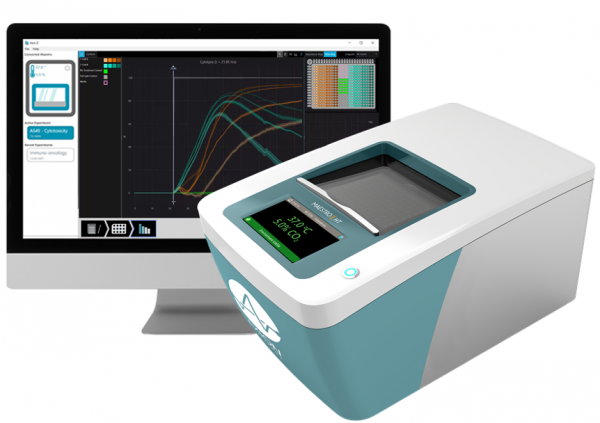
Axion BioSystems’ Maestro ZHT platform uses bioelectronic sensor technology that noninvasively monitors cell health and behavior automatically, without labels, capturing the complete experiment for minutes or days in a single plate.Joining other players in the real-time, live-cell assay space like Sartorius and Agilent, Axion brings its user-centered design to the table.
With sensitive bioelectrodes recording every moment in vitro, the Maestro Z product line noninvasively captures immune cell-mediated killing from start to finish. While live-cell imaging techniques like Sartorius’s Incucyte® often require dyes that could impact the myriad of immune signaling pathways in unknown ways or generate high backgrounds and reduce sensitivity, bioelectrodes noninvasively measure as the immune response remains undisturbed.
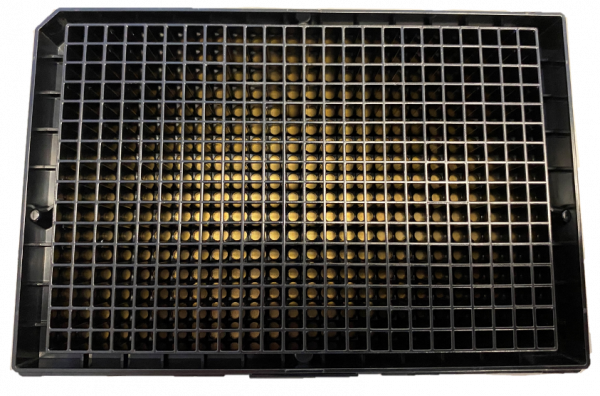
How the Maestro ZHT compares
These capabilities were on display in a study performed at the University of Georgia. Associate Professor of Regenerative Medicine Lohitash Karumbaiah, Ph.D. and his colleagues used the Maestro ZHT to monitor immune cell-mediated killing of patient-derived glioma stem cells by GD2 targeted CAR-T cells. Even at a low effector:target ratios of 0.1:1, GD2 CAR-T cells killed over 50% of the glioma cells, highlighting GD2 as a promising target for glioblastoma.
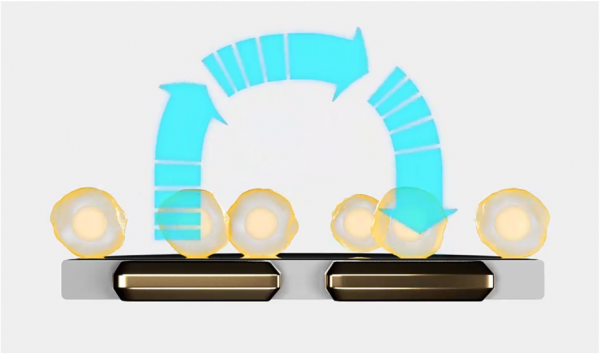
With the capability to measure 384 wells simultaneously and the fast, intuitive software design Axion products are known for, the Maestro ZHT can quickly screen candidates, quantifying the potency while capturing the kinetics concurrently. By integrating an incubator into a small benchtop footprint, Axion has overcome the space and additional cost limitations of competitive systems that must be housed individually in large incubators. In anticipation of the large number of immunotherapies poised to enter a regulatory environment, the system and software comes cGLP and cGMP ready, ensuring a continuity of work between the development and quality control departments.
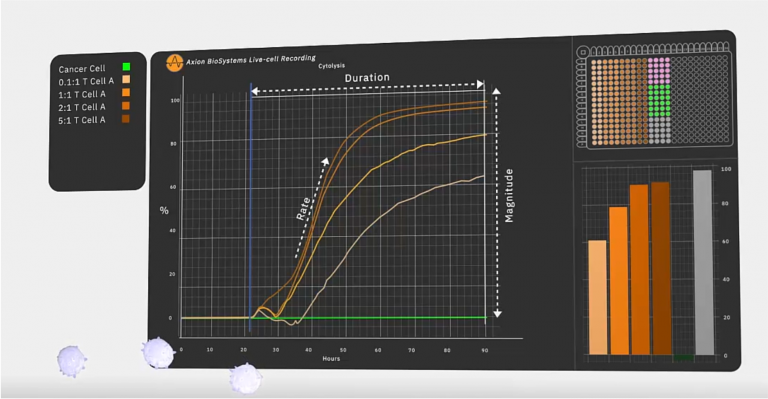
Looking forward
With 233% growth in the immuno-oncology development pipeline between 2017 and 2020 many breakthroughs are sure to be seen in the next few years. Quantifying potency will need to be a routine component of development and manufacturing, guiding candidate selection and ensuring product quality. As such, it is important to choose the right assays from the start. With the Maestro Z product line, Axion BioSystems brings a streamlined assay to better model biology, guide development, and test cell therapy quality in every lab.
